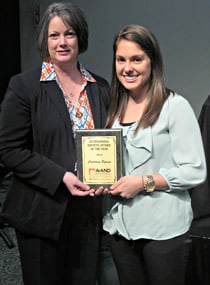Dietetic Intern, Alumni Receive National, Statewide Awards
June 12, 2014 | When counseling patients about special dietary needs or improvements, Courtney Byrum said it’s the “light bulb moment” — “I see the look in their eyes when they fully grasp a concept” that she enjoys.

Courtney Byrum
Byrum, of Little Rock, who graduated in May from the Dietetic Internship Program that is a combined program of the UAMS College of Health Professions and Central Arkansas Veterans Healthcare System (CAVHS), was recently chosen as the Arkansas 2014 Dietetic Intern of the Year. This national award is given annually by the Academy of Nutrition and Dietetics to one dietetic intern from each state, recognizing outstanding academic achievement as well as involvement in campus and community service.

Courtney Byrum (right) receives the 2014 Outstanding Dietetic Intern of the Year from the Arkansas Academy of Nutrition and Dietetics.
Byrum was honored in April at the Arkansas Academy of Nutrition and Dietetic’s annual meeting along with two other alumni of the program. Erin King Moore, a 2010 alumnus, was selected as the Recognized Young Dietitian of the Year and Shannon Owens Hendrix, 1999 alumnus, was chosen as the Dietitian of the Year for the state of Arkansas.
This is the third year in a row that this national award has gone to a UAMS dietetic intern.
“Courtney’s performance in the classroom was always superior, but beyond that, she was described by preceptors as having a strong work ethic, being an emerging leader in the field of dietetics and a caring and compassionate individual,” said Tina Crook, Ph.D., director of the internship program and an assistant professor in the college’s Department of Dietetics and Nutrition.
Byrum attributed part of her interest in nutrition to her mother, also a dietitian. “I grew up always being interested in food and healthy eating,” she said.
She started studying nursing until a basic nutrition class sparked her interest. She soon switched academic paths, leading to the dietetic internship program. She just started as a registered dietitian in the CAVHS and will continue working toward a master’s degree.
“I had a great internship experience, going through different one- to three-week rotations at hospitals, facilities and organizations in central Arkansas,” said Byrum, who said clinical rotations in diabetes and critical care units were favorite experiences.
With diabetes, diet is a major method for controlling the chronic disease, she said. Dietitians work to educate patients about food or eating choices that can help regulate blood sugar levels.
For patients in critical care units, she said, a dietitian is part of the interprofessional care team, making suggestions about which types and rates/amounts of tube feedings or parenteral nutrition for patients, as well as assessing overall nutrition status of patients, she said.
